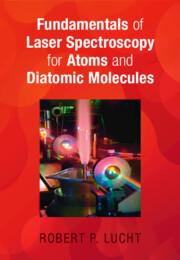Book contents
- Frontmatter
- Dedication
- Contents
- Preface
- 1 Introduction
- 2 Atomic Structure and the Quantum Mechanics of Angular Momentum
- 3 Structure of Diatomic Molecules
- 4 Quantum Mechanical Analysis of the Interaction of Laser Radiation with Electric Dipole Resonances
- 5 Quantum Mechanical Analysis of Single-Photon Electric Dipole Resonances for Diatomic Molecules
- 6 Absorption and Emission Spectroscopy
- 7 Raman Spectroscopy
- 8 Coherent Anti-Stokes Raman Scattering (CARS) Spectroscopy
- Spherical Harmonics and Radial Wavefunctions for One-Electron Atoms
- Clebsch–Gordan Coefficients, Dipole Moments, and Spontaneous Emission Coefficients for the 2p–1s Transition in Atomic Hydrogen
- Properties and Values for Selected 3j Symbols
- Properties and Values for Selected 6j Symbols (Weissbluth, 1978)
- Allowed LS Coupling Terms for Equivalent d2 Electrons
- Derivation of the Higher-Order Density Matrix Elements for Doublet and Triplet Electronic Levels
- Einstein Coefficients for Spontaneous Emission for the X2Π–A2Σ+ (0,0) Bands of OH and NO and the X3Σ−–A3Π (0,0) Band of NH
- Effect of Hyperfine Splitting on Radiative Transition Rates
- Voigt Function Values
- References
- Index
3 - Structure of Diatomic Molecules
Published online by Cambridge University Press: 12 December 2024
- Frontmatter
- Dedication
- Contents
- Preface
- 1 Introduction
- 2 Atomic Structure and the Quantum Mechanics of Angular Momentum
- 3 Structure of Diatomic Molecules
- 4 Quantum Mechanical Analysis of the Interaction of Laser Radiation with Electric Dipole Resonances
- 5 Quantum Mechanical Analysis of Single-Photon Electric Dipole Resonances for Diatomic Molecules
- 6 Absorption and Emission Spectroscopy
- 7 Raman Spectroscopy
- 8 Coherent Anti-Stokes Raman Scattering (CARS) Spectroscopy
- Spherical Harmonics and Radial Wavefunctions for One-Electron Atoms
- Clebsch–Gordan Coefficients, Dipole Moments, and Spontaneous Emission Coefficients for the 2p–1s Transition in Atomic Hydrogen
- Properties and Values for Selected 3j Symbols
- Properties and Values for Selected 6j Symbols (Weissbluth, 1978)
- Allowed LS Coupling Terms for Equivalent d2 Electrons
- Derivation of the Higher-Order Density Matrix Elements for Doublet and Triplet Electronic Levels
- Einstein Coefficients for Spontaneous Emission for the X2Π–A2Σ+ (0,0) Bands of OH and NO and the X3Σ−–A3Π (0,0) Band of NH
- Effect of Hyperfine Splitting on Radiative Transition Rates
- Voigt Function Values
- References
- Index
Summary
The structure of diatomic molecules is discussed in this chapter. The electronic structure of diatomic molecules is then discussed in detail. The coupling of the orbital and spin angular momenta of electrons and the angular momentum associated with nuclear rotation are discussed, with an emphasis on Hund’s cases (a) and (b). The rotational wavefunctions for diatomic molecules in the limits of Hund’s cases (a) and (b) and in the case intermediate between Hund’s cases (a) and (b) are then discussed in detail. For molecules that are of importance in combustion diagnostics, such as OH, CH, CN, and NO, the electronic levels are intermediate between Hund’s cases (a) and (b). We use Hund’s case (a) as the basis wavefunctions, and linear combinations of these wavefunctions are used to represent wavefunctions for electronic levels intermediate between cases (a) and (b). The choice of case (a) wavefunctions as the basis set is typical in the literature although case (b) wavefunctions can also be used as a basis set.
Keywords
- Type
- Chapter
- Information
- Publisher: Cambridge University PressPrint publication year: 2024

